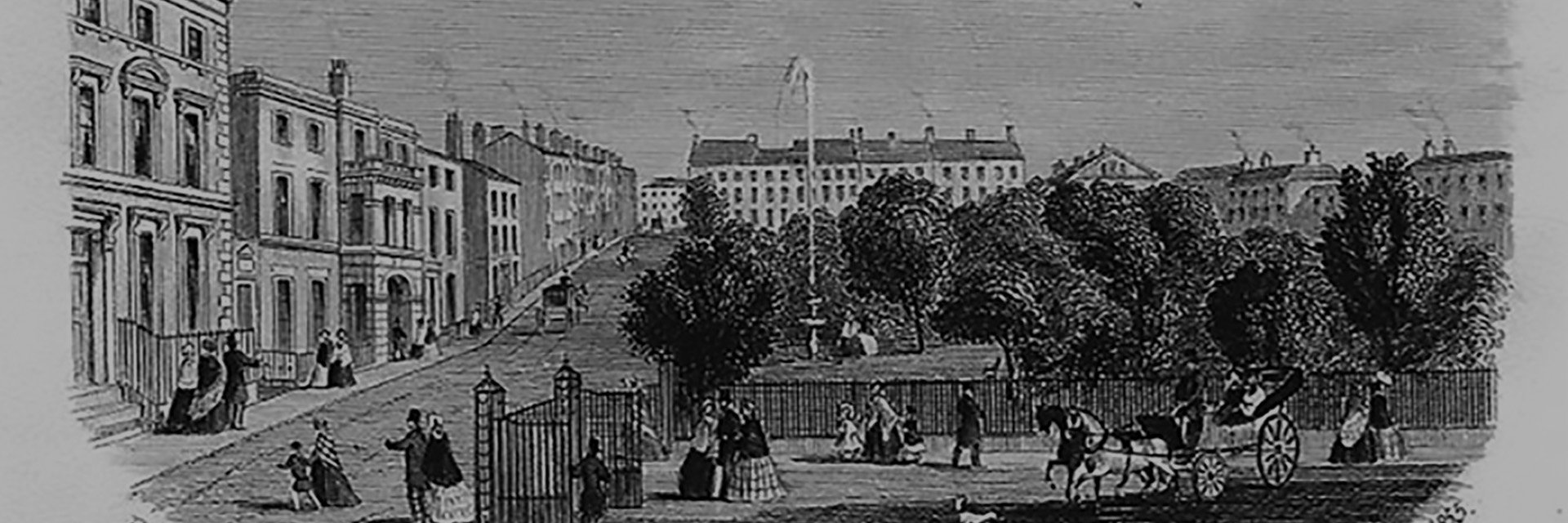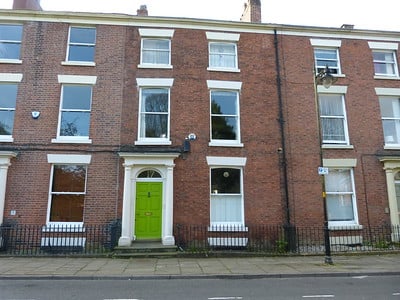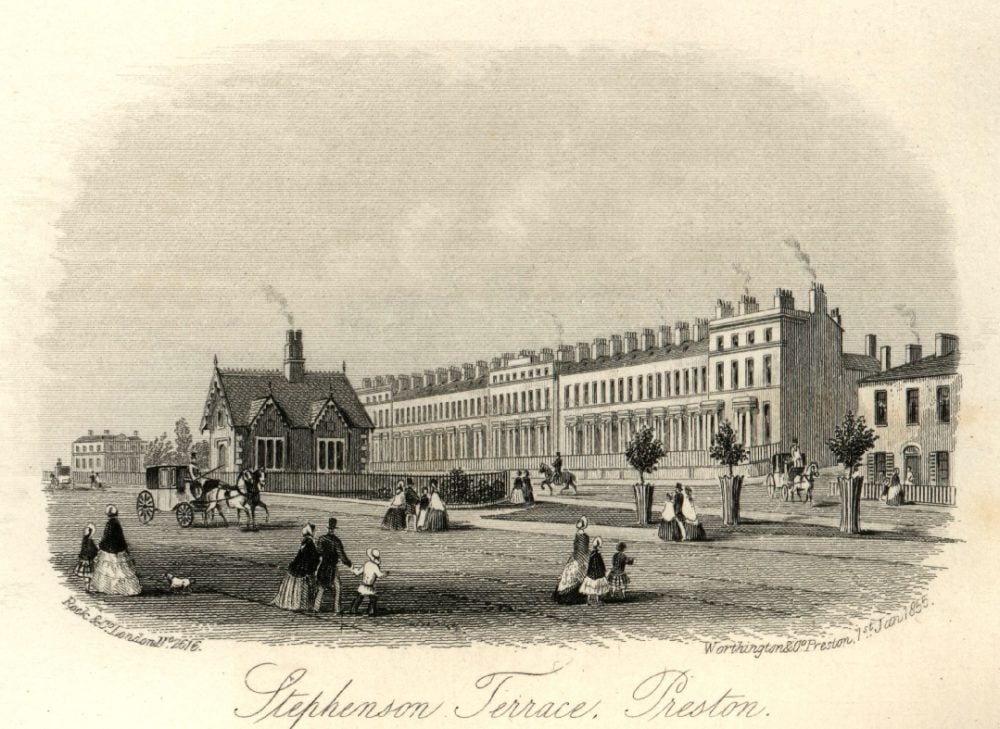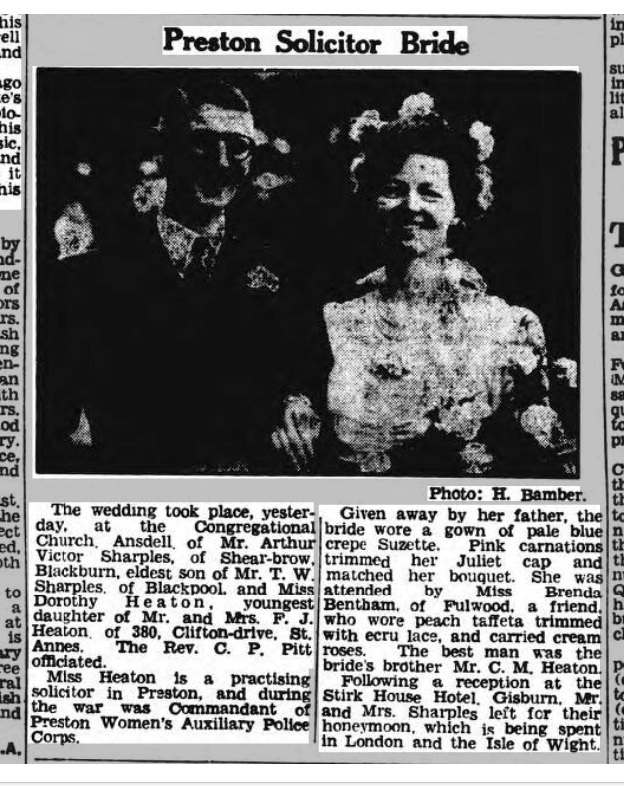
Dorothy Heaton
1914 - 1983 | 17 Winckley Square

Dorothy Heaton qualified as a solicitor in the mid-1930s and for a time was Preston’s first and only woman solicitor. She set up her own firm and specialised in divorce and paternity work. Her particular focus was meeting the needs of women clients.
Dorothy’s early life
Dorothy was born on 8th June 1914 in Preston to Annie Moston Heaton (née Worthington) of Ribbleton and Frederick James Heaton, a tea merchant. Her father had founded the Belfast Tea Co. in 1897 with his savings of £2.12s.6d and this later became the British Tea Company located in Latham Street off Avenham Lane. He was also a town councillor and the owner of the old John Bull bus company of Fleet Street (later taken over by Ribble Motors). The family lived at 68 Stephenson Terrace, a Georgian terrace overlooking the ‘Deepdale enclosure’, a triangular park on Deepdale Road, they later moved to the more prosperous North Promenade in St. Annes. Lancashire Evening Post (LEP) 20.04.1953

At the age of 21, Dorothy was an articled clerk to Mr. H. Fazackerley of Smith Fazackerley & Ashton Solicitors at their 42 Cannon Street office. She had a brief brush with the law when she found herself in court for speeding at 38mph in Bamber Bridge! Mr. Fazackerley defended his clerk, stating that she was anxious to return to work. The chairman hoped that Mr. Fazackerley would give her more time in future and fined her 10 shillings. LEP 20.09.1935
Dorothy Heaton Solicitors
By October 1937, Dorothy had moved to the offices of Sinton’s solicitors in 17 Winckley Square on the south side: overlooking the gardens. Patrick I. M. Sinton was a young solicitor, firstly in practice as ‘Washington and Sinton’ and latterly as a sole practitioner. He died suddenly in September 1937 at the age of 29. He and his new bride, Joan, were living in St. Annes and it may be that he and Dorothy had social as well as professional connections. At some point, Dorothy took over his practice. It became Dorothy Heaton Solicitors.
From early in her career, Dorothy was active in civic life, chairing a meeting of Preston Women Citizens’ Association on civil liberties and describing her work as a solicitor as ‘absorbing and keenly interesting’.
Lancashire Daily Post 09.03.1937.
In February 1939, as a member of the same organisation, she spoke on ‘Women in the eyes of the law’ saying that ‘women’s status had been materially altered by modern legislation’. She explained the various Married Women’s property acts, stating that:
‘it was not until 1936 that the law ceased to regard women as weaker beings not fit to have the full and unrestricted control of their own property’.
LEP 22.02.1939
Much of Dorothy’s work concerned divorce and paternity cases which were not straightforward: there was at that time the need to prove grounds for divorce. A private member’s bill in 1923 had made it easier for women to petition for divorce for adultery, but it still had to be proved. In 1937, the law was changed and divorce was allowed on other grounds including drunkenness, insanity and desertion.
With the start of World War 2, Dorothy volunteered for civil defence duties in the Women’s Auxiliary Defence Corps. She had the role of Commandant of the Preston section. In an article in the Lancashire Evening Post on 11th November 1939, she urged women to carry their gas masks at all times, saying that ‘the least we can do is to put up with this very minor annoyance for the sake of protecting ourselves’. Along with many others she also contributed to a fund for fuel for a Spitfire.
Dorothy marries Arthur Sharples 1946
After the war ended, Dorothy married a successful industrial chemist, Arthur Sharples, in October 1946 at the Congregational Church Ansdell (now a United Reform Church known locally as The White Church). They celebrated at Stirk House Hotel, Gisburn then left for their honeymoon in London and the Isle of Wight.

It may have been a shared love of music that brought them together. On 29th May 1952, ‘The Stage’ reported that Dorothy and Arthur had jointly written a new waltz song ‘Come back to Ireland’ for Mr. Phil Kelly, a new Irish silver tenor. Mr. Kelly joined Frank Randle’s ‘Scandals’
Arthur wrote a great many musical pieces including a rousing march for which Dorothy wrote the words; the result was a patriotic song entitled ‘Good Queen Bess, a coronation song’, which was sent to the Queen who, it was reported, replied with a letter of thanks.
LEP 15.08.1952.
Dorothy also used her talent for writing poetry to give children a better understanding of the parables in the Bible by re-writing some in verse; these were put on sale and the proceeds given to church funds.
LEP 09.12.1957
She supported church events for children in other ways: by judging a Sunday Schools’ Union Music Festival LEP 21.04.1947 and by taking part in a mock trial at a ‘Preston Youth for Christ’ rally at Lancaster Road Congregational Church.
LEP 04.05.1957
She supported church events for children in other ways: by judging a Sunday Schools’ Union Music Festival LEP 21.04.1947 and by taking part in a mock trial at a ‘Preston Youth for Christ’ rally at Lancaster Road Congregational Church.
LEP 04.05.1957
In 1946 Preston Council proposed that part of Winckley Square Gardens be used as a car park. At that time the gardens had no railings, were overgrown and were littered with redundant amenities from the war including an empty rusted disintegrating iron water tank and surface air-raid shelters. Most of the once-private residences had been converted into offices and it was said that the occupants had no personal interest in the gardens. However, Dorothy’s offices overlooked the part of Winckley Square Gardens proposed for development and she, along with other residents, complained in the newspaper:
Winckley Square ought to be a sanctuary in the midst of the busy life of the town. The suggestion of turning it into a car park horrifies me’.
LEP 29.05.1946
Dorothy’s last articled clerk, who started working for her in 1967, recounted that his first job each day was to take her Boston terrier for a walk in Winckley Square Gardens! He gave an insight into Dorothy’s character: a formidable woman with a rather ‘prickly personality’, she was highly respected and revered by her peers in the legal profession. Sadly, she started to suffer from multiple sclerosis in her early 50s but carried on working hard for as long as she could. She retired in 1968 and her firm continued to include her name as ‘Dorothy Heaton Bradbury & Co’.
In 1983, she died at the age of 68 in a nursing home in Ansdell and was buried in Lytham.